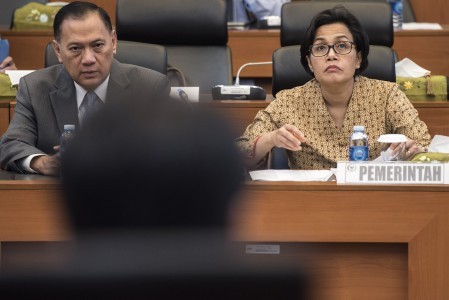Popular Reads
Top Results
Can't find what you're looking for?
View all search resultsPopular Reads
Top Results
Can't find what you're looking for?
View all search resultsEDITORIAL: Deposit insurer short of funds
The financial system is now fairly stable and strong enough to weather such a reform.
Change text size
Gift Premium Articles
to Anyone
T
he government should take seriously a warning from the Deposit Insurance Corporation (LPS) about its gross funding inadequacy, which raises questions about its ability to reimburse depositors of major banks in case of a crisis.
It now collects premiums at a fixed rate of 0.2 percent of total deposits from all banks, without considering their specific level of risk. The 2016 Financial System Crisis Prevention and Mitigation (PPKSK) Law does allow the LPS to issue bonds, but only in an emergency, when bond yields are unusually very high.
The latest assessment of Indonesia’s financial system stability by the International Monetary Fund concluded in May that systemic risk is low and the banking system appears generally resilient to severe shocks.
The problem, though, is that we hardly know when or from where a financial crisis will strike. Indonesia in particularly is vulnerable to sudden shocks in the global economy, given the dominance of foreign portfolio investors. Foreigners own at least 50 percent of shares and 40 percent of bonds traded on secondary markets, among the highest in the region.
Experience from the 1997-1998 financial and economic crisis shows that even the closure of 15 small banks that accounted for less than 2 percent of the total banking assets could trigger financial panic.
The vulnerabiliy has increased, because the number of commercial banks (120 at present) is still too high to allow effective supervision. Even though the 20 largest banks account for more than 85 percent of total banking assets, financial distress hitting several banks at once could trigger a major crisis.
The LPS told an international conference on deposit insurance in Yogyakarta last week that, as of April, it had only about Rp 80 trillion (US$6 billion) in bailout funds, while the estimated 100 small and medium-size banks with capital ranging from less than Rp 1 trillion to Rp 5 trillion had more than Rp 740 trillion in third-party deposits and the 20 largest banks held more than Rp 4 quadrillion.
What makes the position of depositors even more precarious in a major crisis is that the PPKSK Law allows the LPS to bail out only the systemically important banks (the 20 largest). This means that most small and mid-size banks that face severe liquidity problems or insolvency will either be taken over or closed down by the LPS. Only systematically important banks are entitled to short-term liquidity credits from Bank Indonesia if they have enough securities to cover loans.
Given the absence of alternative sources of funds for the LPS in the near future, it is perhaps time now for the government to revise down the Rp 2 billion ceiling on deposits covered by the LPS to prompt depositors to move their savings to big banks, thereby accelerating the industry’s consolidation. The ceiling is way higher than in most other countries, where it ranges from $90,000 to $100,000.
The financial system is now fairly stable and strong enough to weather such a reform.










